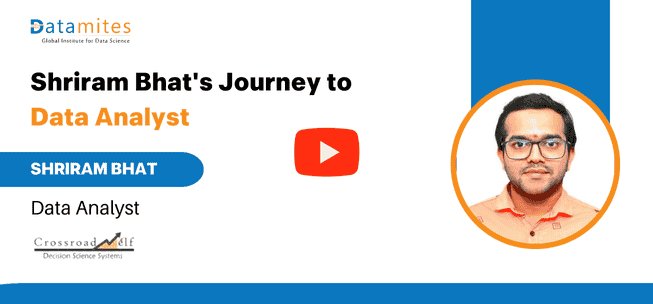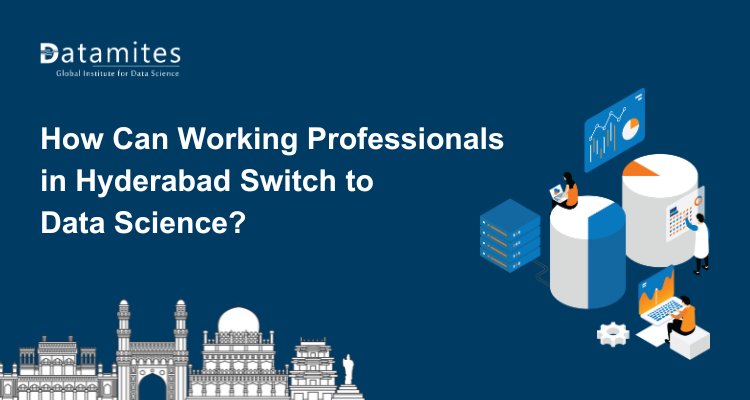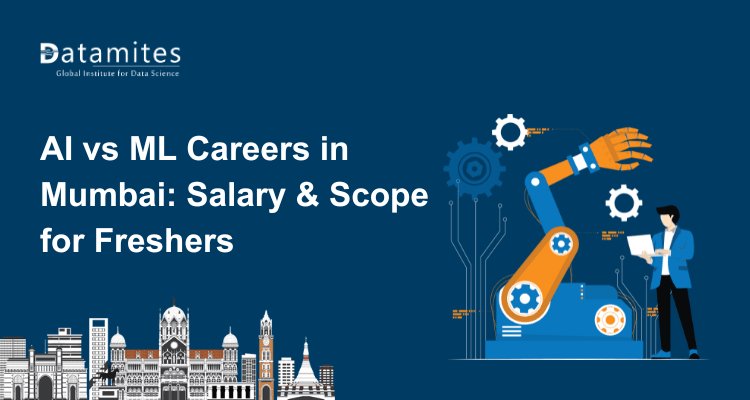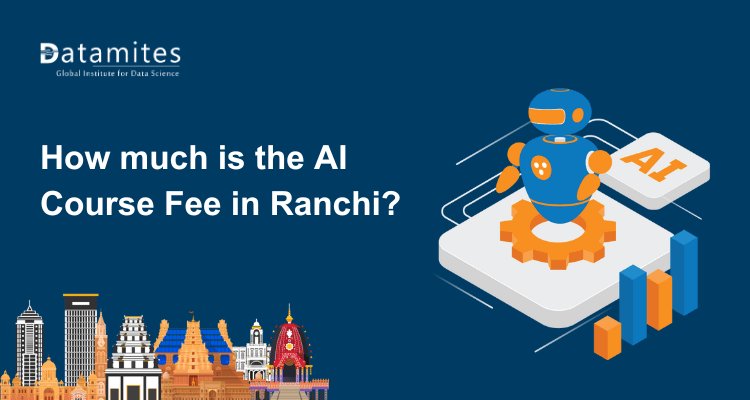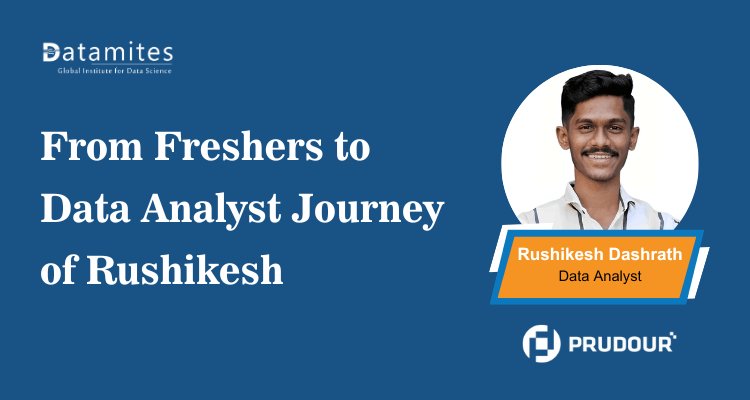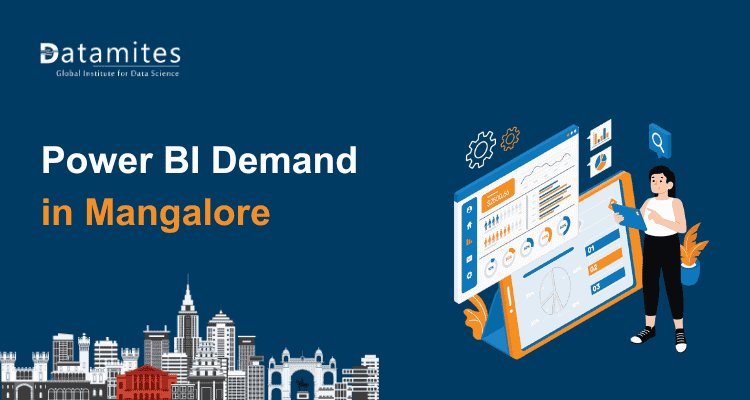Shriram Bhat's Journey to Data Analyst
Discover Shriram Bhat's journey to becoming a Data Analyst. Learn how he transitioned careers, acquired essential skills, completed hands-on projects, and secured opportunities, inspiring others to build a successful path in the data analytics field.
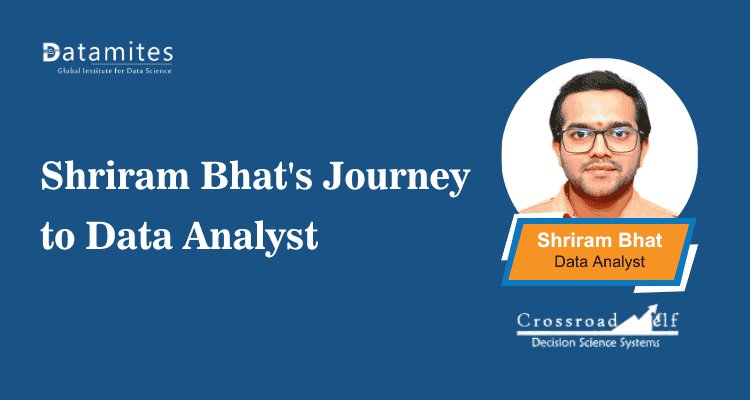
Switching careers can be stressful, especially from a non-IT background. Yet, Shriram Bhat, a mechanical engineer turned data analyst, shows it’s possible with dedication and the right guidance. At DataMites, he mastered core analytics skills and secured a Data Analyst role at Crossroad Alf, inspiring aspiring career changers.
From mechanical engineer to data analyst: Shriram inspiring journey
This DataMites success story highlights the inspiring journey of Sriram, a Mechanical Engineering graduate who transitioned into an emerging career in data analytics. He shares his learning experience, challenges, and practical advice for aspiring data analysts.
Q1: Could you tell us a little about your background before entering data analytics?
A: I graduated in Mechanical Engineering in 2021 and worked for over a year as a design engineer. While I learned a lot, I was fascinated by the way businesses used data to improve processes and decision-making. That curiosity led me to switch my career path.
Q2: What motivated you to pursue a career in data analytics?
A: Data is like the new oil it drives business growth and innovation. In my previous company, I often saw how data was crucial in product design and decision-making. I wanted to build a career where I could use data to solve problems, improve processes, and contribute to organizational success.
Q3: Why did you choose to start as a Data Analyst instead of directly pursuing Data Science?
A: Coming from a mechanical background, I wasn’t deeply familiar with programming. Data Science requires extensive coding and machine learning expertise. Data Analytics, on the other hand, focuses on SQL, Power BI, Tableau, and some Python basics, which felt more approachable for me. I plan to gain experience as a Data Analyst first and later explore Data Science.
Refer to the articles below:
- Prakash's inspiring journey as a data analyst
- Little Flower’s Inspiring Journey as Data Analyst
- Aman's transformative journey to data analyst
Q4: How was your learning experience at DataMites?
A: It was excellent. The program started with Excel, moved to SQL, and then advanced to visualization tools like Tableau and Power BI. We also covered Python basics (NumPy, Pandas) and got introduced to machine learning concepts through the Orange tool. The hands-on projects, such as sales analysis and HR analysis, were especially helpful in applying concepts.
Q5: What challenges did you face during the learning phase?
A: Tools like Power BI and Tableau were easier to grasp, but SQL was more challenging because it requires logical problem-solving. I had to practice a lot to master queries and database connections.
Q6: Can you share your interview experience?
A: My placement process went smoothly. After completing effective cover letter, mock interviews and projects, I got my first interview opportunity. The company mainly tested me on SQL, database basics, and Power BI. Luckily, I cleared the interview in my first attempt and secured a role as a Data Analyst at Crossroad Alf.
Q7: What advice would you give to aspiring data analysts?
A: Practice as much as you can with different datasets and real-world scenarios. Don’t just stick to classroom exercises explore more. Keep learning continuously, especially new tools and business applications of data.
Key findings from Shriram Bhat’s data analyst journey
Shriram Bhat’s shift from mechanical engineer to data analyst reflects determination, continuous learning, and smart decisions. His journey showcases the challenges, skills, and strategies that enabled a successful career transition in analytics.
- Career gaps are not barriers: Even with extended breaks, strong skills and focused learning can open doors in data analytics. Determination and practical experience ensure that career gaps don’t limit opportunities.
- SQL and statistics need practice: Mastering SQL and statistical concepts requires consistent effort and logical thinking. Regular hands-on exercises and practice make these technical areas easier to handle.
- Projects enhance employability: Working on data analyst projects provides real-world exposure and practical experience. Client-focused and scenario-based projects help bridge the gap between theoretical learning and professional work.
- Mock interviews build confidence: Structured placement readiness programs at DataMites simulate real interview scenarios. Practicing mock interviews improves problem-solving skills, communication, and overall confidence for job applications.
- Employers value skills over background: Business knowledge, analytical thinking, and problem-solving ability matter more than prior industry experience. A strong skillset in tools and analytics makes candidates highly employable.
- Lifelong learning is essential: Continuously learning new tools, techniques, and applying knowledge through data analyst projects keeps professionals relevant. Upskilling ensures analysts stay competitive in a fast-evolving industry.
Sriram’s shift from Mechanical Engineering to Data Analytics shows how determination, consistent practice, and mentorship can break barriers. With DataMites’ guidance, he gained strong technical skills, secured his first job, and proved that career transitions are possible with the right mindset and by choosing the top IT courses in demand.
Refer to the articles below:
- Data Analyst Career Scope in India
- What would be the Data Analyst Course Fee in India?
- How to Become A Data Analyst – Best Certification Courses in India
DataMites Institute is a leading name in IT training, offering specialized programs in Data Science, AI, Machine Learning, Python, Data Analyst course in Hyderabad, Data Engineering, and IoT. Through hands-on projects, internships, and comprehensive placement assistance, students develop job-ready skills. Additionally, globally recognized certifications from IABAC and NASSCOM FutureSkills strengthen their professional credentials.
Beyond its Data Analyst courses in Bangalore, DataMites also provides flexible, industry-relevant training in major cities like Mumbai, Pune, Hyderabad, Ahmedabad, Chandigarh, Delhi, Jaipur, and Coimbatore. This ensures that high-quality IT education is accessible to learners across India, aligned with evolving industry demands.
